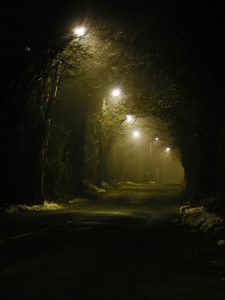 If I were preaching this coming Sunday (which I’m not … but if I were …), I’d look at darkness. Strange choice, perhaps, for the Sunday after Christmas Day, but the Episcopal Church lectionary always specifies the prologue of John’s Gospel as the gospel lesson for this Sunday and it includes that verse: “The light shines in the darkness, and the darkness did not overcome it.”[1]
If I were preaching this coming Sunday (which I’m not … but if I were …), I’d look at darkness. Strange choice, perhaps, for the Sunday after Christmas Day, but the Episcopal Church lectionary always specifies the prologue of John’s Gospel as the gospel lesson for this Sunday and it includes that verse: “The light shines in the darkness, and the darkness did not overcome it.”[1]
My friend Scott, a scholar of all things Scottish (“If it’s not Scottish, it’s crap!” — Thank you, Mike Myers, for that memorable proclamation![2]) recently posted to Facebook the Scots version of the verse in question: “An, aye, the licht shon i the mirk, an the mirk dinnae slacken it nane.”
Mirk! This wonderful, archaic Scots word is the origin of the modern English “murky” and “murkiness.” What a great perspective it offers for our understanding of the light shining in the darkness!
All too often, I think, we read this verse and its theological meaning as if “darkness” were capitalized, as if the referent were some sort of powerful, personalized evil. And, then, of course, we move on to the unspoken, frequently unrecognized, conclusion that it has nothing to do with us. We act as if “Darkness” is something removed from us, something cosmic over which we have no control and with which we have no dealings, something eternal separate and apart from our own lives.
That misunderstanding, in itself, is proof that it is not and the Scots “mirk” underscores that for us. Murkiness is not simply darkness. The word also connotes cheerlessness and confusion, and those are definitely characteristics we all share from time to time. We are confused about darkness, about evil, about our own need for light and clarity. We are often cheerless, sometimes right in the midst of the most joyous of circumstances: consider, for a moment, all those people for whom Christmas is, for whatever reason, a time of sadness and depression. Render the verse with those words, with those alternative meanings of darkness, of mirk, of murkiness, and it takes on new and immediate meaning: “The light shines on our cheerlessness and confusion, and cheerlessness and confusion do not overcome it.”
Not only do they not overcome it, they don’t even, in the other wonderful word of the Scots version, slacken it. They do not lessen it. They don’t make a dent in it. Not one little bit. To the contrary, the light overcomes the darkness, the mirk, the murkiness, the confusion, the cheerlessness in our lives. “Lighten our darkness” pleads one of our prayers;[3] relieve our confusion; gladden our cheerlessness. That is what the Incarnation is all about. It may be about some cosmic and eternal battle between good and evil, removed from our everday lives, but much, much more than that, it’s personal; it’s immediate; it’s quotidian.
I’m not preaching this Sunday, but if I were … I’d look at the broader, and yet more personal, meaning of “darkness,” at darkness as murkiness, cheerlessness, and confusion, how none of that lessens by even the least little bit the light of joy, and how personal and everyday the Incarnation really is.
====================
Notes:
Click on footnote numbers to link back to associated text.
[1] John 1:5



Leave a Reply